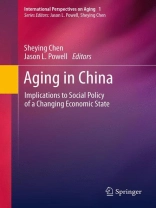China, which is fast on its way to becoming the most powerful economic force in the world, has four unique characteristics that distinguish it from other countries in Asia: (1) The proportion of aging population is growing faster than that of Japan (the country previously recognized as having the fastest rate) and much faster than nations in western Europe. (2) An early arrival of an aging population before modernization has fully taken place, with social policy implications. It is certain that China will face a severely aged population before it has sufficient time and resources to establish an adequate social security and service system for older people. (3) There will be fluctuations in the total dependency ratio. The Chinese government estimates are that the country will reach a higher dependent burden earlier in the twenty-first century than was previously forecast. (4) The government’s fertility policy (single child per family) and its implementation has a strong influence on the aging process. Fewer children are being born, but with more elderly people a conflict arises between the objectives to limit population increase and yet maintain a balanced age structure (Peng and Guo 2001). The intersection of these fourfold factors means that the increased aging population is giving rise to serious concerns among Chinese social policy makers. There is a chronic lack of good resource materials that attempt to make sense of social policy in its relationship to examining the problems and possibilities of human aging grounded in an analysis of economic of social policy in China and impact on rural and urban spaces. Such analysis of China will be covered by conceptual, theoretical, and empirical approaches. The book will also discuss substantive topics of housing, community care, family care, pensions, and mental health. The book brings together a truly world class array of researchers to provide discussions of critical implications of aging social policy and theeconomic impact in China.
विषयसूची
Chapter 1. Introduction: Social Policy of the Changing Economic State.- Chapter 2. China and the Bio medicalization of Aging: Implications and Possibilities.- Chapter 3. Aging: The Role of Work and Workplace Implications – Changing Expectations in the US and China.- Chapter 4. Pensions and Social Assistance: The Development of Income Security Policies for Old People in China.- Chapter 5. Rural Old Age Support in Transitional China: Efforts between Family and State.- Chapter 6. Social Policy, Family Support, and Rural Elder Care.- Chapter 7. China’s Family Support System: Impact of Rural-Urban Female Labor Migration.- Chapter 8. The Utility of Enhancing Filial Piety for Eldercare in China.- Chapter 9. Gendered Social Capital and Health Outcomes among Older Adults in China.- Chapter 10. An East-West Approach to Mind-Body Health of Chinese Elderly.- Chapter 11. Family Caregiving and Impact on Caregiver Mental Health: A Study in Shanghai .- Chapter 12. Housing Stratification and Aging in Urban China.- Chapter 13. Institutional Care.- Chapter 14. Chaning Welfare Institution and Evolution of Chinese Nonprofit Organizations: The Story of Elder Care Homes in Urban Shanghai.- Chapter 15. Aging Policy Integrative Appraisal System (Apias) in the Asia Pacific Region: A Case Study on Macao Special Administrative Region.
लेखक के बारे में
Dr. Sheying Chen is Associate Provost and Professor of Social Policy at Pace University in New York City, USA. Previously, he served at Indiana University Southeast as Professor and Associate Vice Chancellor for Academic Affairs, the University of Guam as Professor and Dean of the College of Professional Studies which comprised three former colleges: Business & Public Administration; Education; Nursing, Social Work & Health Sciences. He held tenure as Chair and Professor at the City University of New York, College of Staten Island, and was on the permanent faculty as Coordinator for Higher Degrees and Graduate Affairs at Zhongshan University, Guangzhou, in one of the key Chinese sociology departments first re-established after the Cultural Revolution in China. He has studied aging over the past 25 years and wrote the first book comparing community care in China with the outside world. He designed the first national training program for social policy educators and authored the first public lecture series on community service. He conducted research in Hong Kong and introduced social work education in China. His Ph.D. and MSW are from the University of California, Los Angeles, where he was deeply involved in aging, health, and welfare reform research projects. He also holds an M.A. in sociology from Zhongshan University and an undergraduate diploma in engineering from Changsha Technological College (now part of Central-South University), China. Dr. Jason L. Powell is Reader in Sociology and Social Policy and Executive Director of Knowledge Exchange in Faculty of Humanities and Social Sciences at University of Liverpool, United Kingdom. Previously, he was Associate Dean of three faculties: Faculty of Humanities and Social Sciences; Faculty of Social and Environmental Studies; and Interim Associate Dean of Faculty of Arts. He held posts of Associate Head of School and Director of Admissions at the University of Salford. Currently, Dr Powell also holds several Visiting Professorships in Social Gerontology: United States, Canada, South Africa and Australia. In 2003, President of Gerontological Society of America invited him as Visiting Professor. Dr. Powell is an experienced researcher with an international reputation in research area of social gerontology and relationship to global ageing, social welfare, third sector and health care policy. He has authored 172 professional publications worldwide on social gerontology including 12 books in past 4 years. He serves on over 45 international editorial boards including International Journal of Social Welfare, International Journal of Human Development, Rejuvenation Research and Research on Aging. He is also Guest Editor of Aging International on “Comparative Aging” which is based at Harvard University and is Associate Editor of the Canadian Journal of Sociology. The Journal of Applied Gerontology has a special issue focusing on Dr. Powell’s contribution to applied gerontology and social theory in 2009. In 2008, Dr Powell and associates won ‘Highly Commended Article for the Year’ award by Emerald Publishers for an article on risk and old age in International Journal of Sociology Social Policy. He is Series Editor of ‘Social Perspectives on Aging’ series for Nova Science Publishers in New York.












